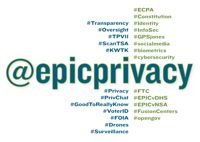« May 2012 | Main | July 2012 »
June 2012 Archives
June 1, 2012
June 4, 2012
EPIC Asks Ombudsman to Investigate DHS FOIA Practices
June 6, 2012
Homeland Security Seeks to Expand "Risk-Based" Profiles
June 7, 2012
LinkedIn Breach Leads to 6.5 Million Stolen Passwords
June 5, 2012
Consumer Privacy Rights Resolution
Consumer Privacy Rights Resolution
Lillie Coney,
EPIC Associate Director
Trans Atlantic Consumer Dialogue
Washington, DCJune 5, 2012
June 6, 2012
"First Do No Harm. Does Technology Harm Patients?"
"First Do No Harm. Does Technology Harm Patients?"
Lillie Coney,
EPIC Associate Director
2nd International Summit on the Future of Health Privacy
Washington, DC
June 6, 2012
June 7, 2012
IPv6, New Internet Protocol, Launches with Privacy Questions
June 8, 2012
Swiss Court Sets Out Requirements for Google Street View in Switzerland
Department of Homeland Security Exempts Massive Database from Privacy Act
EPIC Urges FTC to Protect Privacy of Myspace Users
June 12, 2012
Spokeo to Pay $800, 000 to Trade Commission to Settle Privacy Violations
FCC Issues Stronger Telemarketing Rules to Protect Consumers
New Report Finds Border Surveillance Drone Program Inefficient and Ineffective
June 15, 2012
Administration Announces First Privacy "Multistakeholder" Meeting
June 18, 2012
House to Consider Bill to Reauthorize Expansive Surveillance Law
EPIC Honors Sen. Al Franken, the Honorable Judge Kozinski, Dana Priest, Whitfield Diffie, and Willis Ware
June 20, 2012
EPIC Joins Open Government Groups in Freedom of Information Act Case
EPIC Argues That Resellers of State Driver Records Should Be Strictly Liable Under Privacy Law
Senator Schumer: High Resolution Mapping Must Respect Privacy
Facebook Acquires Facial Recognition Company Face.com
June 21, 2012
House Panel Votes to Renew Surveillance Law Without New Safeguards
June 22, 2012
EPIC Calls for Suspension of Homeland Security's "Risk-based" Profiling System
National Association of Attorneys General to Focus on "Privacy in Digital Age"
June 11, 2012
EPIC's 2012 Champion of Freedom Awards Dinner
Join Dahlia Lithwick,
Senator Al Franken,
Judge Alex Kozinski,
and Dana Priest for
EPIC's 2012 Champion of Freedom Awards Dinner
Washington, D.C.
June 11, 2012
June 27, 2012
Senate Judiciary Holds Hearing on Voter Suppressions
EPIC Calls On FTC to Investigate Facebook Email Changes
June 28, 2012
Supreme Court Dismisses Challenge to Congress's Ability to Define Harm
Homeland Security Seeking Applicants to Join Privacy Board
June 25, 2012
Supreme Court Says Federal Immigration Law Trumps Arizona Law, But Upholds Narrow Application of "Papers Please" Provision
June 28, 2012
Administration Releases More Details on Privacy Multistakeholder Meeting
Search
About June 2012
This page contains all entries posted to epic.org in June 2012. They are listed from oldest to newest.
May 2012 is the previous archive.
July 2012 is the next archive.
Many more can be found on the main index page or by looking through the archives.
Movable Type Pro 6.3.3
